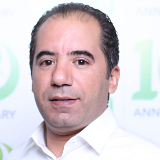Performance Magazine Portrait Feature: Mehdi Chaabouni
 Many individuals begin their careers in the field of Business/Performance Management. For others, such knowledge comes over time, as an added layer of specialization to their existing primary professional prowess.
Many individuals begin their careers in the field of Business/Performance Management. For others, such knowledge comes over time, as an added layer of specialization to their existing primary professional prowess.
Zain’s very own Mehdi Chaabouni is one such example. Having graduated with a Business Administration degree, followed by a Master’s in Valuation and Risk Management, Mr. Chaabouni began his career at the International Arab Bank of Tunisia (BIAT), as a Jr. Financial Analyst.
After a few months, he moved on to Orascom Telecom, where he was first picked up as a Fixed Asset Expert Accountant, and after three months, became an Expert Revenue Accountant. His experience proved exceptionally valuable, given that after a couple of years, he took up the mantle of Fixed Assets Accounting Manager for Orange Tunisie.
In 2013, he joined Zain, as a Financial Controller. However, since by this point, his financial, administrative and management expertise was undeniable, he rose to the ranks of Budgeting & Business Planning Specialist, followed by an advancement to Head of Business Performance & Decision Support, in addition to his more recent role of Strategy & Corporate Performance General Manager.
Inspired by the works of John Doerr – Measure what matters, and Eckhart Tolle – The power of now, Mr. Chaabouni welcomed his newfound role with open arms, as it provided him with a plethora of new professional adventures.
As the newly-appointed Head of the Strategy division, he found himself facing a challenge like none other by that point. Alongside the company’s management representatives, he had to develop an entirely new strategic direction, for the following 3 years.
Staring down the barrel of what could have been a potentially tangled maneuver, he decided to employ the use of the Balanced Scorecard, to ensure things stay within normal parameters, and that the company will be able to gauge its progress in the upcoming months and years.
The implementation of the BSC came as a major personal achievement and proved to be quite an exciting experience, since there were so many new indicators to take into consideration. Moreover, with the BSC in place, everyone at Zain now had a new outlook on their future results.

Elucidating the unknown through Performance Management
Two years ago, when Mr. Chaabouni first began his journey into the world of Performance Management, his whole career had only focused on finance and budgets. There were no employee-related indicators to measure, no strategies to put in place or non-financial projects to evaluate.
For him, this area of expertise was an exploratory quest, during which he understood that Performance Management is an ongoing process. Through PM, you constantly seek to identify, measure and develop your employees’ performance, as its ultimate goal is to achieve the following:
- Allow employees to focus on the most important aspects of their job
- Align individual objectives with business goals & objectives
- Optimize and streamline employees’ individual performance
- Identify key result areas that need improvement
“You might never know the reason for your failure, without any performance management system in place.”
However, by aiding the employee, PM also helps managers and the business as a whole.
For the employee, PM clarifies expectations, provides self-assessment opportunities and defines a clear career path, seeking to promote job satisfaction, coherence & engagement.
For the manager, Performance Management saves invaluable time, as it enables efficient and consistent performance across the board, for all of their employees.
For the organization, PM improves all matters that pertain to the bigger picture. It improves the organizational bottom line, boosts productivity, renders communication barriers almost obsolete and establishes clear accountability for each goal, objective, task or project. Furthermore, by creating a transparent work environment, it nurtures employee trust & loyalty, minimizing turnover.
Keep an open communication channel
Speaking of transparency, Mr. Chaabouni notes that if neither managers, nor employees understand what is the company’s executive strategy, how can anyone expect them to know how to conduct their daily, weekly or monthly errands?
Each decision to undertake a certain task must be connected to the overall strategy, in some form or shape. That’s why it is important to keep things clear between all parties involved, ensuring everything everyone does ultimately aligns with the performance management plan.
“It’s the executive’s job to ask where we’re going. It’s the managers’ and employees’ duty to find out what we have to do, to get there.”
An ideal performance management system is one that encourages managers to set expectations. Moreover, it promotes informal feedback sessions, on a regular basis, setting one’s employees on the road to success and empowering their developmental process.
In addition to this, a well-built PM system keeps said employees thoroughly interested in maximizing the organization’s well-being, because they recognize it is tied to theirs. However, even the best systems and intentions don’t always hit their stride. Employee disengagement can occur due to several reasons, either internal or external, but most often than not, the former causes much more permanent damage than the latter.
In these types of situations, if your company has established a clear line of communication between all employees and managers, it’ll be much easier to gauge what’s causing the feeling of despondency. For many employees, this is due to the lack of financial incentives, such as performance bonuses that may be awarded per project or per annum.
Obviously not all performance is going to be equal, and each bonus should reflect that, however that should not be treated as an excuse for leaders to not reward their employees fairly.

Now, fairness is more or less subjective. What’s fair to one person may not be fair to another. That’s fair to say. Nonetheless, due to one’s presumably open communication channels and solid performance management system, there are ways to tie bonus incentives & remuneration to objective results.
One point to keep in mind is the fact that monetary impetuses may not be the end-all-be-all solution for everyone. You have to maintain honest conversations with your members of staff and identity what they need, for many of them might be content with their current salaries, but they might need more responsibility in their daily professional lives. Not all employees require big bucks to deliver riveting results.
“Here’s what your tasks are, that’s how you can track your progress and here’s the way you assess what you’ve done so far.”
Ownership over processes and objectives has become an integral cog of today’s work flow machine. In an increasingly greater number of organizations, people receiving more control over what they do, day in – day out, contributes to building the aforementioned feeling of trust.
You know that the company trusts you to handle yourself. This builds connection and rapport between both sides, increasing the chances that employees will want to retain their spot on the current roster.
However, none of this is possible if there is no honest & open communication channel, where people can voice their opinions, griefs, needs and suggestions. Placing equal importance on external and internal customer feedback is the key to building a sustainable business.
Learning to take life in, one step at a time
One final aspect that we discussed with Mr. Chaabouni is that of finding the holy grail of today’s job-led lives – the perfect work-life balance. We’ve concluded that there is none!
In all seriousness, he does note that finding a balance between our professional and personal lives is not only critical to our physical, emotional and mental well-being, but our career health as well.
When people speak of the perfect balance between work and life, they most likely imagine having an extremely productive first half of the day at work, leaving early and spending the other half of the day with our loved ones. This is generally a fairytale scenario, which seldom occurs in every day life.
However, that does not mean we should fall into the most common pitfall, of allowing our work to invade our home. We need rest, respite and relaxation. We need to unwind, in order to return the next day and give 100%.
Furthermore, no work-life balance can truly begin to take place unless we find a job that we like, if not love. Work isn’t just about making money – it’s about identifying what will help us grow.
“If you absolutely hate what you do, you are not going to be happy or do your job very well, plain and simple.”
One does not have to fall completely head over heels with their job. You do not have to love your workplace like there’s no tomorrow. You simply have to find those things which are exciting enough that you do not dread getting out of the bed each morning.
Lastly, try your best to prioritize your health. Set goals & stick to them. You don’t have to come up with the most in-depth plan, with daily physical exercises. You can simply practice meditation, go for short jogs or cycling sessions.
As the old Latin adage goes – mens sana in corpore sano, one needs to maintain their physical form, if they wish to upkeep their mental one. That’s also a quick method of balancing out your work-life stability, especially nowadays, when office hours have gotten longer and office work more demanding.
Not everyone will find joy in the same things, so you just have to keep looking for what holds your interest, and then make it your very own healthy habit. Try your best to keep track of what’s important, namely equilibrium, and you should be well on your way to developing a sustainable method of managing your lifestyle.
Image sources:
Tags: Communication, Employee Performance, Interview, Performance Management





